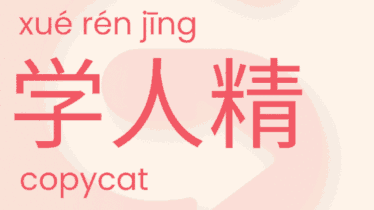Terms about Love in Chinese
Like many languages, there are certain terminology in Chinese to address people about love in Chinese. As relationships play an important role, people came up with certain names for their loved ones (or, well, really any other person matching one of the following descriptions!). Today we will provide a window into a list of endearing terms used among lovers, friends, and modern digital interactions in China. If you have already studied Chinese for a while, you may actually be familiar with one or the other.
Terms about Love in Chinese
Romantic relationships in China are often characterized by affectionate nicknames. Below are a few!
亲爱的 (qīn’ài de) – Dear
– Equivalent to “dear” in English, this is a common and affectionate term used by couples.
宝贝 (bǎobèi)- Baby
– Similar to “baby” in English, it conveys a deep sense of affection and endearment. However, there is a more “cute” connotation to it opposed to the English “baby”. Compare it to “babe” for a second, and you’re closer to getting its usage!
宝贝儿 (bǎobèir) – Baby
…is a variation of 宝贝 with a more casual tone, often used in northern China.
心肝 (xīngān) – Sweetheart
– Literally “heart and liver,” indicating someone extremely precious. Interestingly, many languages have terms referring to the other person as some organ, such as apple (of one’s eye, in German, English or Persian), most commonly there exist liver and heart.
小心肝 (xiǎo xīngān) – Little Sweetheart
…is a diminutive form of 心肝 (xīngān), expressing tenderness.
甜心 (tiánxīn) – Sweetheart
– You may also use this one for “sweet heart,” used similarly to its English counterpart.
亲亲 (qīnqīn) – Kissy
– A playful term akin to “honey” or “sweetie.”
小亲亲 (xiǎo qīnqīn) – Little Kissy
…is an even more affectionate version of 亲亲, emphasizing intimacy.
老公/老婆 (lǎogōng/lǎopó) – Husband/Wife
– This may be the most common word you will hear between Chinese couples (usually married). Factually, it is used affectionately by couples, even if not legally married.
爱人 (àirén) – Lover
– Directly translates to “lover” or “the person I love” and may be used by married couples. However, in recent years it is used rather superficially by many people and is therefore not to be taken too seriously, depending on who is speaking. A better term may be 情人 (qíngrén)! Note that it is not commonly used to directly address the person, as in calling them. But rather: “She is my love.”
Terms of Endearment Among Friends
Friends in China use a variety of nicknames. Here are some popular terms:
好兄弟 (hǎo xiōngdì) – Good Brother
– A very common term for close male friends, emphasizing loyalty. “He is my good brother.”
哥们 (gēmen) – Bro
– Used among male friends to indicate a close, brotherly relationship. Note that also it is used similarly to the English “Bro” and “Dude”, or “man”, in situations where you may express annoyance or similar. For example, “Bro, what kind of movie is this please?!”
铁哥们 (tiě gēmen) – Close Brother
– “Iron brothers,” indicating a very strong bond among male friends.
麻吉 (máji) – Buddy
– Borrowed from Taiwanese Hokkien, popular among younger generations.
姐妹 (jiěmèi) – Sister
– Used among female friends to signify a sister-like bond.
闺蜜 (guīmì) – Best Friend (Female)
– Used among female friends to denote a very close and trusted friend.
小伙伴 (xiǎo huǒbàn) – Buddy
– A term for close friends or companions, akin to “buddy.”
小伙伴们 (xiǎo huǒbànmen) – Buddies
… is the plural form, often used in groups.
-死党 (sǐdǎng) – Bestie
– Literally “sworn friends,” indicating a deep and loyal friendship.
发小 (fàxiǎo) – Childhood Friend
– Friends who have known each other since childhood.
老铁 (lǎo tiě) – Old Iron
– A slang term used to describe very close and reliable friends.
亲密战友 (qīnmì zhànyǒu) – Intimate Comrade
– Indicates a very close and trustworthy friend, often with a bit of a humorous tone.
Modern and Online Terms of Endearment
The rise of digital communication has introduced many new terms of endearment that have come to be very popular among the youth! These terms basically originate from internet culture and are widely used in interactions online.
亲 (qīn) – Dear
– Often used in online shopping and social media for a friendly and casual address.
小可爱 (xiǎo kě’ài) – Cutie
– Used to call someone cute or adorable, similar to “cutie.”
男神/女神 (nánshén/nǚshén) – Male/Female Idol
– Terms for highly admired individuals, often for their looks or talent.
宝 (bǎo) – Precious
– A short form of 宝贝 (bǎobèi), used among friends and loved ones.
萌 (méng) – Adorable
– You will see this ever so often on platforms like Bilibili (the Chinese “YouTube”). Derived from Japanese, it is used to describe something or someone extremely cute but is basically used for all kinds of aspects in a video, like a cute animation or drawing.
萌萌哒 (méngméng dā) – Adorably Cute
…away to describe someone or something as adorable and may be equally common as the one above
学霸 (xuébà) – Top Student
– Literally “study tyrant,” used to describe someone very academically talented.
吃货 (chīhuò) – Foodie
– Used affectionately for someone who loves food.
小仙女 (xiǎo xiānnǚ) – Little Fairy
– Describes a girl who is cute and seems somehow ethereal.
逗比 (dòubǐ) – Goofball
– A playful term for someone who is funny and a bit silly.
女汉子 (nǚ hànzi) – Tough Girl
– Used to describe a girl who is strong and independent (also, very common!)
老司机 (lǎosījī) – Old Driver
– Slang for someone who is experienced, often used humorously.
小哥哥/小姐姐 (xiǎo gēge/xiǎo jiějie) – Little Brother/Sister
– Cute terms to address a young man or woman, often used flirtatiously.
大神 (dàshén) – Master
– Used to describe someone who is very skilled, especially in gaming.
爱豆 (àidòu) – Idol
– Borrowed from English “idol,” used for celebrities and influencers.
吃瓜群众 (chī guā qúnzhòng) – Onlookers
– Literally “melon-eating crowd,” used to describe people who are just watching events unfold, usually online drama.
There you go! Is there another culture so devoted to calling each other by nicknames? It is hard to think of one! Getting a gist of these names and when they are appropriate to be used will, in the first place, enable you to follow online interaction on Chinese platforms better and understand why people call each other a certain way. They may also help you to bond better with your friends and dive more deeply into Chinese norms and culture!








